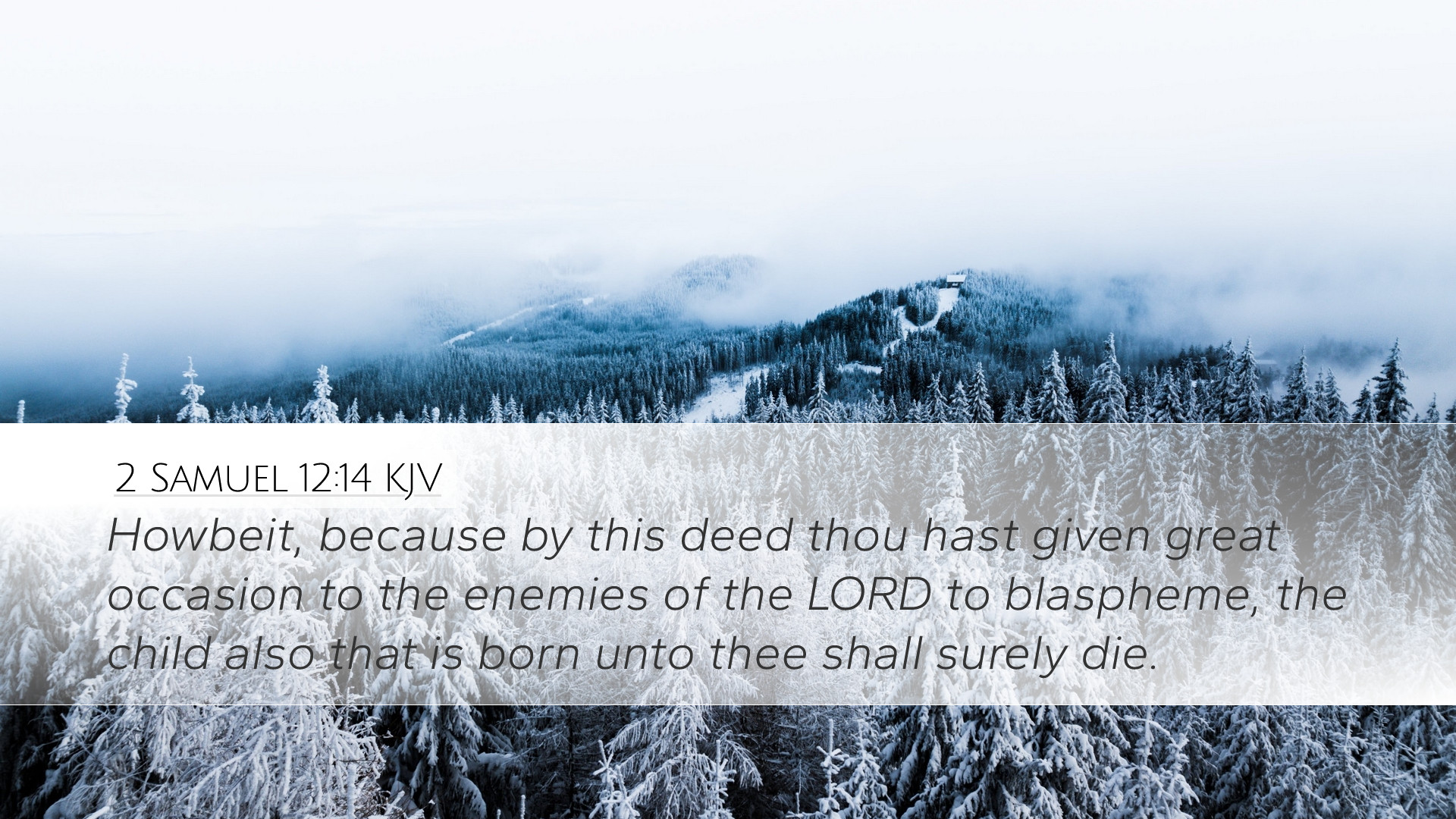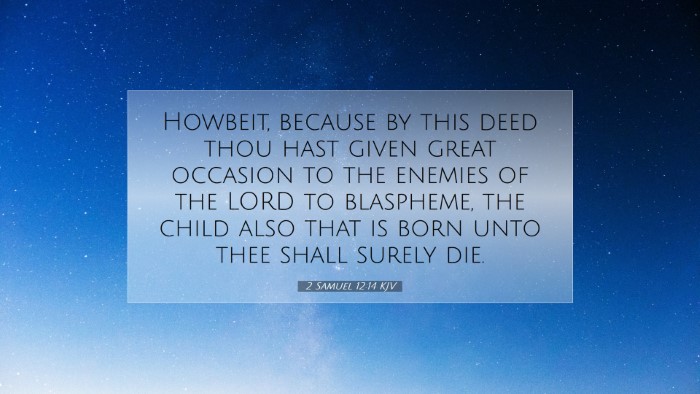Commentary on 2 Samuel 12:14
2 Samuel 12:14 states:
"Nevertheless, because by this deed you have given great occasion to the enemies of the LORD to blaspheme, the child also that is born unto you shall surely die."
This verse encapsulates the severe consequences of King David's sin with Bathsheba and highlights the gravity of sin, particularly in a leader’s life. It serves as a pivotal moment not only in David’s personal life but also in the broader context of God’s covenant relationship with His people.
Contextual Background
In previous chapters, we witness David's fall into sin, his attempt to cover it, and ultimately, the Lord’s confrontation through the prophet Nathan. This passage illustrates the profound moral and spiritual ramifications of David's actions.
Theological Insights
The commentary on this verse by various theologians offers rich insights into its implications:
-
Matthew Henry:
Henry emphasizes that the sin of David not only affects him personally but also has communal implications. His actions provide the enemies of the Lord with a reason to blaspheme. Henry poses that the integrity of a leader is vital for the spiritual health of the community.
-
Albert Barnes:
Barnes focuses on the judgment that was pronounced upon David. He notes that while God's mercy is abundant, the consequences of sin are significant. The specific mention of the child’s death illustrates the harsh realities of divine justice while intertwining themes of hope and despair.
-
Adam Clarke:
Clarke provides a detailed examination of the implications of David’s sin. He discusses how it tarnished Israel's witness to surrounding nations and how the resulting calamity serves as a warning against sin. Clarke underscores the necessity of accountability, especially for those in authority.
Sin’s Consequences
The phrase "great occasion to the enemies of the LORD to blaspheme" is striking. This points to the broader effects of personal sin, reminding leaders that their moral lapses can tarnish the perception of God in the eyes of others. The watchful world measures God according to the lives of His people, especially those in positions of authority. This is a call for vigilance in living a life that reflects God’s holiness.
Applications for Leadership
For pastors and leaders, this verse offers critical reflections:
- Accountability: Leaders must cultivate accountability within their ministries to safeguard against moral failures.
- Witness to the World: The behavior of church leaders significantly impacts public perception of God and His church.
- Understanding Grace: While consequences may be severe, understanding God’s grace is also essential for restoration.
Understanding Divine Justice
The death of the child born to Bathsheba raises profound theological questions about God’s justice and mercy. It conveys the stark reality that God’s ways are higher than our ways, and His decisions transcend human understanding:
-
Henry’s Perspective:
Henry notes that the child's death serves not only as a punishment for David but also illustrates the serious nature of sin, bringing about an outcome that is both judgment and a moment of divine character revelation.
-
Barnes’ Reflection:
Barnes highlights that while God’s judgment may appear harsh, it is rooted in divine wisdom and justice, reminding us that God is sovereign and has the ultimate authority over life and death.
-
Clarke's Commentary:
Clarke adds that the death of the child should not be seen merely as punitive but also as part of God's overarching plan for redemption through suffering, hinting at the greater grace to come.
The Role of Prophetic Warning
This narrative reinforces the crucial role of the prophet in Israel, exemplified by Nathan's bold confrontation of David. It signifies God's commitment to justice and righteousness, providing a model for how leaders should respond to divine correction:
- Guidance and Counsel: Pastors are encouraged to seek godly counsel and listen for the Lord's correction in their lives and ministries.
- Understanding Consequences: The need for transparent leadership is necessitated by the awareness of consequences, not just for oneself, but for the community at large.
- Restoration and Hope: Despite his grievous sin, David’s path to restoration reminds us that repentance can lead to renewed relationship with God, offering hope even after profound failure.
Conclusion
In 2 Samuel 12:14, we find a sobering reminder of the interconnectedness of our actions, the seriousness of sin, and the implications for our testimony before the world. The collective insights from Matthew Henry, Albert Barnes, and Adam Clarke articulate a profound theological depth that calls for reflection, repentance, and a renewed commitment to living in a manner that honors God. The path of obedience, while marked with trials, ultimately leads to divine restoration and renewed purpose.


